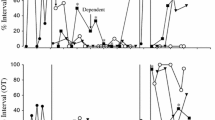Abstract
Two contingency systems, individual and group, were evaluated for their effects on children's behavior during small group meetings. Fortyeight children, ages 8 through 14, attended a 7-week residential camp program operated on a token economy system. Ratings of the campers' behavior were made by the counselors on a 5-point rating scale at the daily meetings. Each camper received both contingency programs, in counterbalanced order. Data were gathered during baseline, two feedback and two treatment phases. An analysis of variance for repeated measures was performed on the mean weekly camper scores. The two systems were equally effective in significantly increasing the amount of desirable behavior, and there was no effect on behavior due to feedback alone. The results are discussed in terms of advantages and disadvantages of each type of contingency system, with some suggestions made regarding areas of further investigation.
Similar content being viewed by others
References
Alexander, R. N., Corbett, T. F., & Smigel, J. The effects of individual and group consequences on school attendance and curfew violations with predelinquent adolescents.Journal of Applied Behavioral Analysis, 1976,9, 221–226.
Axelrod, S. Comparison of individual and group contingencies in two special classes.Behavior Therapy, 1973,4, 83–90.
Drabman, R. S., Spitalnik, R., & Spitalnik, K. Sociometric and disruptive behavior as a function of four types of token reinforcement programs.Journal of Applied Behavioral Analysis, 1974,7, 93–101.
Ellery, M. D., Blampied, N. M., & Black, W. A. Reduction of disruptive behavior in the classroom: Group and individual reinforcement contingencies compared.New Zealand Journal of Educational Studies, 1975,10, 59–65.
Grandy, G. S., Madsen, C. H., & DeMersseman, L. M. The effects of individual and interdependent contingencies on inappropriate classroom behavior.Psychology in the Schools, 1973,10, 488–493.
Hallowitz, E. Camping for disturbed children.Mental Hygiene, 1950,34, 406–422.
Hamblin, R. L., Hathaway, C., & Wodarski, J. S. Group contingencies, peer tutoring, and accelerating academic achievement. In R. Ulrich, T. Stachnik, & J. Mabry (Eds.),Control of human behavior (Vol. 3). Glenview, Illinois: Scott, Foresman, 1974.
Harms, E. Camps as mental health institutions.Nervous Child, 1947,6, 127–130.
Hayes, L. A. The use of group contingencies for behavioral control: A review.Psychological Bulletin, 1976,83, 628–648.
Herman, S. H., & Tramontana, J. Instructions and group versus individual reinforcement in modifying disruptive group behavior.Journal of Applied Behavioral Analysis, 1971,4, 113–119.
Johnson, S. M., & Bolstad, O. D. Methodological issues in naturalistic observation: Some problems and solutions for field research. In L. A. Hamerlynk, L. C. Handy, & E. J. Mash (Eds.),Behavior change: Methodology, concepts and practice. Champaign, Illinois: Research Press: 1973.
Lattal, K. A. Contingency management of toothbrushing behavior in a summer camp for children.Journal of Applied Behavioral Analysis, 1969,2, 195–198.
Litow, L., & Pumroy, D. A brief review of classroom group-oriented contingencies.Journal of Applied Behavioral Analysis, 1915,8, 341–347.
Long, J. P., & Williams, R. L. The comparative effectiveness of group and individual contingent free time with inner city junior high students.Journal of Applied Behavioral Analysis, 1973,6, 465–474.
O'Leary, K. D., & Drabman, R. S. Token reinforcement programs in the classroom: A review.Psychological Bulletin, 1971,75, 379–398.
Page, P. D., & Edwards, R. P. Behavior change strategies for reducing disruptive classroom behavior.Psychology in the Schools, 1978,15, 413–418.
Phillips, E. L., Phillips, E. A., Wolf, M. M. & Fixsen, D. L. Achievement place: Development of the elected manager system.Journal of Applied Behavioral Analysis, 1973,6, 541–561.
Rickard, H. C., & Dinoff, M. Shaping adaptive behavior in a therapeutic summer camp. In L. P. Ullmann & L. Krasner (Eds.),Case studies in behavior modification. New York: Holt, Rinehart & Winston, 1965.
Rickard, H. C., & Dinoff, M. Behavior therapy in a therapeutic summer camp. In H. C. Rickard (Ed.),Behavioral intervention in human problems. New York: Pergamon Press, 1971.
Rickard, H. C., & Saunders, T. R. Control of “clean-up” behavior in a summer camp.Behavior Therapy, 1971,2, 340–344.
Taplin, P. S., & Reid, J. B. Effects of instructional set and experimenter influence on observer reliability.Child Development, 1973,44, 547–554.
Timm, N. H.Multivariate analysis with applications in education and psychology Monterey, California: Brooks/Cole, 1975.
Wodarski, J. S., Hamblin, R. L., Buckholdt, D. R., & Ferritor, D. E. The effects of low performance group and individual contingencies on cooperative behavior exhibited by fifth graders.Psychological Record, 1972,22, 359–368.
Author information
Authors and Affiliations
Additional information
This study was based on a dissertation submitted to the University of South Carolina, December 1977, in partial fulfillment of the requirements of the Ph.D. degree. The author would like to express appreciation to Dr. Robert Deysach and Dr. Ann Garner for their helpful comments on earlier versions of this manuscript.
Rights and permissions
About this article
Cite this article
Hughes, H.M. Behavior change in children at a therapeutic summer camp as a function of feedback and individual versus group contingencies. J Abnorm Child Psychol 7, 211–219 (1979). https://doi.org/10.1007/BF00918901
Revised:
Issue Date:
DOI: https://doi.org/10.1007/BF00918901




